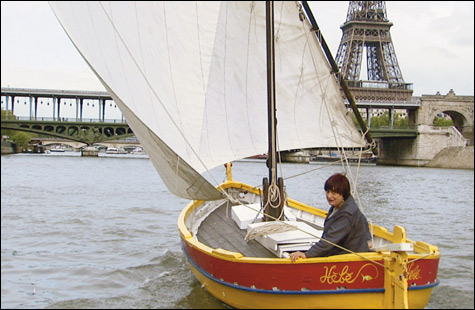
SPEAK, MEMORY: Actually, Varda makes it sing. |
The Beaches of Agnès | Written and Directed By Agnès Varda | With Agnès Varda, Zalman King, Chris Marker, Mathieu Demy, Rosalie Varda, Jim McBride, Andrée Vilar, Stéphane Vilar, and Harrison Ford | Cinema Guild | French | 110 minutes Interview: Agnès Varda. By Gerald Peary. |
After an eventful career as fisherman, photographer, political activist, co-founder of the French New Wave, wife and working partner of Jacques Demy, and the auteur of such films as Cléo From 5 to 7 (1962), One Sings, the OtherDoesn't (1977), and Vagabond (1985), Agnes Varda settles into her 80s as cinema's version of Montaigne. Like the 16th-century inventor of the essay form, Varda in such later documentaries as The Gleanersand I (2000) shapes bits and pieces of her personal life, memories, and observations into random-seeming associations that will cohere into trenchant insights into the human condition. Her new venture in this mode, The Beaches of Agnès [Les plages d'Agnès], achieves the same winning whimsy and sudden illuminations, but by focusing on her own fascinating experience as opposed to looking at the lives of others, she at times loses her delicate balance of mirth, irony, and rue and succumbs to sentiment and cuteness.It's fitting that the film should begin with mirrors, dozens of them of various sizes and often in elaborate frames, planted all over the Belgian beach where she spent much of her childhood. The effect evokes fellow Belgian Magritte; it also prefigures the multi-screen technique to follow. That and Varda's opening statement — "Here I am playing the role of a little old lady, pleasingly plump and talkative, telling the story of my life" — set up a dance of the reflective artifices that make up her memory. A collection of old family photos inspires an attempt to re-create an image of Varda and her sister on the beach. Two little girls play in the sand dressed in replicas of the tiny swimsuits from seven decades ago. Varda is among them, delighted but unconvinced. "Imagining oneself as a child is like running backwards," she says. "Imagining oneself ancient is funny, like a dirty joke."
Not that Varda needs to re-create much, since she's already re-created much of her life, and that of Demy (whose death in 1990 is felt in every frame of Beaches), in her films. Much of her memoir consists of snatches from her previous works (some of which are being screened in the Harvard Film Archive's current "Ciné-Varda" retrospective, with Varda in attendance this weekend), from La Pointe Courte (1954) to The Gleaners and I, with visits to the locations where they were shot as well as interviews with those involved in their making.
This trip down memory lane achieves more than just nostalgia, however. In her sly, unassuming deftness with editing, with voiceover narration, and especially with striking visual conceits, Varda accomplishes no less than a homely cinematic essay on the nature of memory and mortality and the power of film, albeit illusory, to vindicate these aspects of the human condition. In one charming and profound metaphoric sequence, she projects footage from La Pointe Courte onto a screen mounted on a cart. She pushes the cart through the streets of Sète, the Mediterranean port where the film was shot, with the middle-aged children of the now-deceased individuals in La Pointe Courte following behind.